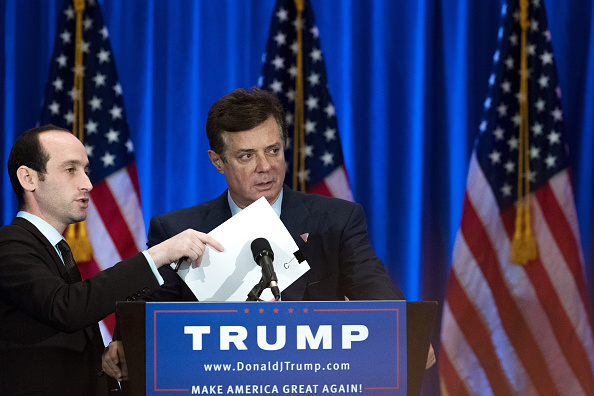Paul Manafort started getting loans from Trump-linked firms on the same day he left the Trump campaign


A free daily email with the biggest news stories of the day – and the best features from TheWeek.com
You are now subscribed
Your newsletter sign-up was successful
On Wednesday, Paul Manafort — President Trump's campaign manager from April through late August — said he will retroactively register with the Justice Department as a foreign agent for his work in Ukrainian politics, citing advice from federal authorities. But two reports on Wednesday also shed some light on Manafort's murky financial history in the U.S. and abroad.
First, The Associated Press reported that Manafort's political consulting firm in Virginia had received at least $1.2 million of the $12.7 million in secret money apparently earmarked for him by the political party of deposed Ukrainian President Viktor Yanukovych in a so-called Black Ledger discovered after Yanukovych's ouster. The money had been wired to Manafort's firms in two installments, in 2007 and 2009, through shell companies in Belize. Manafort, who had previously maintained that the ledger was fake, defended the payments on Wednesday, saying they were legal because they were made through wire transfers not cash, as Ukrainian lawmakers had alleged.
Also on Wednesday, The New York Times reported that Manafort filed papers to create a new shell company, Summerbreeze LLC, on Aug. 19, 2016 — the same day he was pushed out of the Trump campaign — and soon filled it with $13 million in loans from firms with ties to Trump and Ukraine. One loan of $3.5 million came from the private lending arm of Spruce Capital, co-founded by sometime Trump hotel developer Joshua Crane; the other, for $9.5 million, came from Federal Savings Bank of Chicago, headed by Trump economic adviser Stephen Calk. Both loans were reportedly unusual for the lending firms.
The Week
Escape your echo chamber. Get the facts behind the news, plus analysis from multiple perspectives.

Sign up for The Week's Free Newsletters
From our morning news briefing to a weekly Good News Newsletter, get the best of The Week delivered directly to your inbox.
From our morning news briefing to a weekly Good News Newsletter, get the best of The Week delivered directly to your inbox.
"The transactions raise a number of questions, including whether Mr. Manafort's decision to turn to Trump-connected lenders was related to his role in the campaign, where he had agreed to serve for free," The New York Times said. "They also shine a light on the rich real estate portfolio that Mr. Manafort acquired during and after the years he worked in Ukraine," including luxury houses in Los Angeles, homes in Virginia and Florida, and apartments and condos in New York, notably one in Trump Tower — a $3.7 million purchase that apparently endeared him to Trump.
The Treasury Department's financial crimes unit is investigating Manafort's offshore financial transactions in Cyprus, and he is also reportedly a major focus of the FBI's investigation into Russia's meddling in the U.S. presidential election. There is no evidence linking the new revelations to either of those inquiries, and Manafort hasn't been charged with any crime.
A free daily email with the biggest news stories of the day – and the best features from TheWeek.com
Peter has worked as a news and culture writer and editor at The Week since the site's launch in 2008. He covers politics, world affairs, religion and cultural currents. His journalism career began as a copy editor at a financial newswire and has included editorial positions at The New York Times Magazine, Facts on File, and Oregon State University.
-
 How the FCC’s ‘equal time’ rule works
How the FCC’s ‘equal time’ rule worksIn the Spotlight The law is at the heart of the Colbert-CBS conflict
-
 What is the endgame in the DHS shutdown?
What is the endgame in the DHS shutdown?Today’s Big Question Democrats want to rein in ICE’s immigration crackdown
-
 ‘Poor time management isn’t just an inconvenience’
‘Poor time management isn’t just an inconvenience’Instant Opinion Opinion, comment and editorials of the day
-
 TikTok secures deal to remain in US
TikTok secures deal to remain in USSpeed Read ByteDance will form a US version of the popular video-sharing platform
-
 Unemployment rate ticks up amid fall job losses
Unemployment rate ticks up amid fall job lossesSpeed Read Data released by the Commerce Department indicates ‘one of the weakest American labor markets in years’
-
 US mints final penny after 232-year run
US mints final penny after 232-year runSpeed Read Production of the one-cent coin has ended
-
 Warner Bros. explores sale amid Paramount bids
Warner Bros. explores sale amid Paramount bidsSpeed Read The media giant, home to HBO and DC Studios, has received interest from multiple buying parties
-
 Gold tops $4K per ounce, signaling financial unease
Gold tops $4K per ounce, signaling financial uneaseSpeed Read Investors are worried about President Donald Trump’s trade war
-
 Electronic Arts to go private in record $55B deal
Electronic Arts to go private in record $55B dealspeed read The video game giant is behind ‘The Sims’ and ‘Madden NFL’
-
 New York court tosses Trump's $500M fraud fine
New York court tosses Trump's $500M fraud fineSpeed Read A divided appeals court threw out a hefty penalty against President Trump for fraudulently inflating his wealth
-
 Trump said to seek government stake in Intel
Trump said to seek government stake in IntelSpeed Read The president and Intel CEO Lip-Bu Tan reportedly discussed the proposal at a recent meeting
